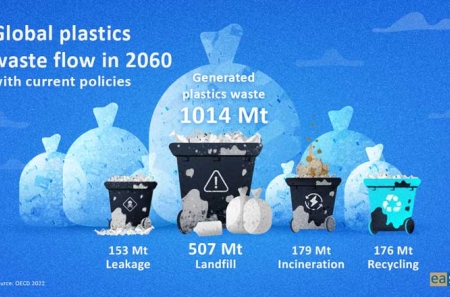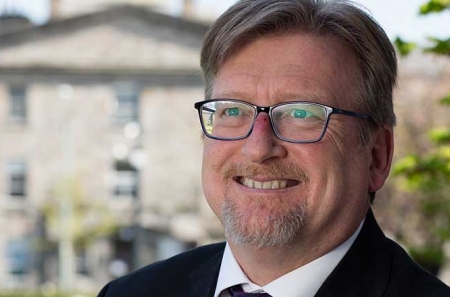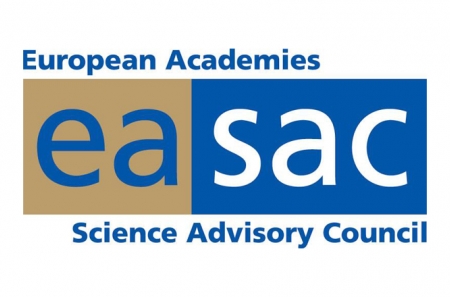
The challenges of ageing must be faced by the young, top scientists tell new Commission
01 July 2019Downloads
A key conclusion of a new report entitled Transforming the Future of Ageing, published by SAPEA (Science Advice for Policy by European Academies) and led by the FEAM (Federation of European Academies of Medicine) is that society must tackle the challenges presented by ageing in every generation and not leave them until old age
The report reviews the best evidence on what public policies might help EU countries to achieve inclusive, fair and sustainable health and social care in the future. The authors, leading scientists nominated by academies across Europe, including Professor Richard Reilly and Professor Rose Ann Kenny who were nominated by the Royal Irish Academy,, conclude that the ageing process needs to be transformed – and that the best way to improve life outcomes in old age is to anticipate and tackle them in youth and middle age.
Professor Jean-Pierre Michel, chair of the working group that wrote the report, said:
“In Europe and around the world, people are living longer than ever before. This is one of the greatest achievements of the past century, and it presents enormous opportunities both for us as individuals: new and fulfilling careers, new insights and perspectives, and an improved quality of life.
“But it also brings challenges for our societies and the European Union as a whole. We must adjust to what is projected to be an ageing and shrinking workforce, and find financially viable ways to deliver high-quality healthcare for all.
“On this, the evidence is clear. When it comes to predicting how people age, genetic factors are relatively minor compared to basic education, lifestyle and behaviours such as a healthy diet and physical activity. Policies to promote these from early childhood, and even in unborn children, contribute directly to a healthy ageing process across people’s whole lives.
“And education improvements at a young age are vital not only to improve individual health, but also to equip our future workforce with the skills it needs to support an ageing population in a rapidly changing society.”
Among the report’s other headline conclusions are:
- Ageing in the future will take place in a very different context from the past and will be profoundly affected by phenomena such as climate change, air pollution and antibiotic resistance, as well as ongoing social changes. Policies will only be successful if they are able to accommodate these changes.
- Age-friendly communities enable older people to feel secure and to go about their daily life comfortably. Architects, urban planners, experts in mobility and ergonomics, social care experts and geriatricians must cooperate to make age-friendly communities the norm.
- Technology, including wearable and assistive devices and the advent of AI, is already changing the experience of ageing, and could transform it if barriers of acceptance and practicality can be overcome.
The SAPEA report informs the forthcoming Scientific Opinion from the European Commission’s Group of Chief Scientific Advisors, which will be delivered directly to European Commissioners to inform future policy-making.
Professor Richard Reilly MRIA
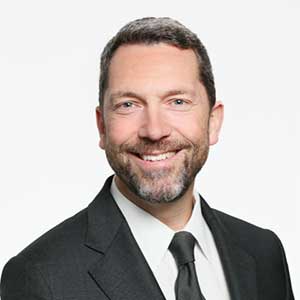 Richard Reilly is Professor of Neural Engineering at Trinity College, Dublin and Director of the Trinity Centre for Bioengineering. This is a joint position between the School of Medicine and School of Engineering. He is Director and a principal investigator of the Trinity Centre for Bioengineering (TCBE) and also a principal investigator at the Trinity College Institute of Neuroscience (TCIN). His research focuses on high density electrophysiologcal and neuroimaging based analysis of sensory and cognitive processing. His research also includes analysis of data acquired from implanted electrodes. His research inputs to the cross-disciplinary translational research at Trinity College on ageing specifically though the Department of Medical Gerontology and the Mercer's Institute on Successful Ageing at St. James's Hospital, Dublin. He has two start-up companies based on his research activities. He is currently the President of the European Society of Engineering and Medicine. In 2004 he was awarded a US Fulbright Award for research collaboration into multisensory integration with the Nathan Kline Institute for Psychiatric Research, New York. He was the Silvanus P. Thompson International Lecturer for the Institute of Electrical Engineers from 1999-2001. Professor Reilly received his BE degree in electronic engineering, a MEngSc and a PhD in biomedical engineering from University College Dublin.
Richard Reilly is Professor of Neural Engineering at Trinity College, Dublin and Director of the Trinity Centre for Bioengineering. This is a joint position between the School of Medicine and School of Engineering. He is Director and a principal investigator of the Trinity Centre for Bioengineering (TCBE) and also a principal investigator at the Trinity College Institute of Neuroscience (TCIN). His research focuses on high density electrophysiologcal and neuroimaging based analysis of sensory and cognitive processing. His research also includes analysis of data acquired from implanted electrodes. His research inputs to the cross-disciplinary translational research at Trinity College on ageing specifically though the Department of Medical Gerontology and the Mercer's Institute on Successful Ageing at St. James's Hospital, Dublin. He has two start-up companies based on his research activities. He is currently the President of the European Society of Engineering and Medicine. In 2004 he was awarded a US Fulbright Award for research collaboration into multisensory integration with the Nathan Kline Institute for Psychiatric Research, New York. He was the Silvanus P. Thompson International Lecturer for the Institute of Electrical Engineers from 1999-2001. Professor Reilly received his BE degree in electronic engineering, a MEngSc and a PhD in biomedical engineering from University College Dublin.
Professor Rose Anne Kenny MRIA
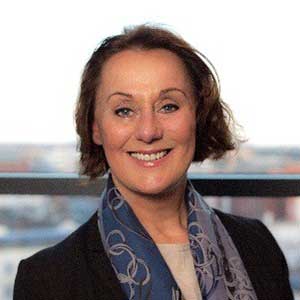 Rose Anne Kenny is Professor of Medical Gerontology, at Trinity College Dublin. Rose Anne was appointed, in 2005, to Trinity College and St. James's Hospital, as Head of the Academic Department of Medical Gerontology and holds the Chair of Medical Gerontology. Rose Anne is the founding Principal Investigator of The Irish Longitudinal Study on Ageing (tilda.ie), where she leads a team of multidisciplinary researchers focusing on psychology, nursing, medicine, physiotherapy, economics, bio-engineering social sciences and health economics as aspects of the ageing process in Ireland. Rose Anne is also the Director of Trinity EngAGE - the Centre for Research in Ageing at Trinity College, Mercer's Institute for Successful Ageing (MISA) and the Falls and Blackout Unit at St. James's Hospital. Formerly Professor of Geriatric Medicine at the Institute for Ageing & Health, Newcastle upon Tyne in the UK, she has been a world leader in research into cardiovascular and mobility disorders in ageing. Rose Anne has been invited faculty and keynote speaker at many international meetings and societies of geriatric medicine, cardiology, psychiatry and neurology. Rose Anne is widely published over 350 peer reviewed publication, 4 textbooks and 51 book chapters. Her current H-Index is 51, according to SCOPUS bibliometrics (November 2015). Her contribution to science and in particular, the field of ageing, has been recognised by many awards, including the Lady Illingworth Research Award - made once of every five years to researcher who has contributed most to age-related research in the UK, the UK National BUPA Foundation Care Award 'For excellence in the development of care of older people' and NHS Modernization Award among many others. Rose Anne was elected as a Member of the Royal Irish Academy (MRIA) in 2014, the highest academic honour in Ireland and a public recognition of academic excellence and achievement. Professor Kenny is a Fellow of Trinity College Dublin and of the Royal College of Physicians in Ireland, London and Edinburgh.
Rose Anne Kenny is Professor of Medical Gerontology, at Trinity College Dublin. Rose Anne was appointed, in 2005, to Trinity College and St. James's Hospital, as Head of the Academic Department of Medical Gerontology and holds the Chair of Medical Gerontology. Rose Anne is the founding Principal Investigator of The Irish Longitudinal Study on Ageing (tilda.ie), where she leads a team of multidisciplinary researchers focusing on psychology, nursing, medicine, physiotherapy, economics, bio-engineering social sciences and health economics as aspects of the ageing process in Ireland. Rose Anne is also the Director of Trinity EngAGE - the Centre for Research in Ageing at Trinity College, Mercer's Institute for Successful Ageing (MISA) and the Falls and Blackout Unit at St. James's Hospital. Formerly Professor of Geriatric Medicine at the Institute for Ageing & Health, Newcastle upon Tyne in the UK, she has been a world leader in research into cardiovascular and mobility disorders in ageing. Rose Anne has been invited faculty and keynote speaker at many international meetings and societies of geriatric medicine, cardiology, psychiatry and neurology. Rose Anne is widely published over 350 peer reviewed publication, 4 textbooks and 51 book chapters. Her current H-Index is 51, according to SCOPUS bibliometrics (November 2015). Her contribution to science and in particular, the field of ageing, has been recognised by many awards, including the Lady Illingworth Research Award - made once of every five years to researcher who has contributed most to age-related research in the UK, the UK National BUPA Foundation Care Award 'For excellence in the development of care of older people' and NHS Modernization Award among many others. Rose Anne was elected as a Member of the Royal Irish Academy (MRIA) in 2014, the highest academic honour in Ireland and a public recognition of academic excellence and achievement. Professor Kenny is a Fellow of Trinity College Dublin and of the Royal College of Physicians in Ireland, London and Edinburgh.
About SAPEA
SAPEA (Science Advice for Policy by European Academies) brings together outstanding expertise in engineering, humanities, medicine, natural and social sciences from over 100 academies, young academies and learned societies across Europe. SAPEA is part of the European Commission’s Scientific Advice Mechanism. Together with the Group of Chief Scientific Advisors, SAPEA provides independent scientific advice to European Commissioners to support their decision-making. SAPEA also works to strengthen connections between Europe’s academies and Academy Networks, and to stimulate debate in Europe about the role of evidence in policymaking.Funded through the EU’s Horizon 2020 programme, the SAPEA consortium comprises Academia Europaea, All European Academies (ALLEA), the European Academies’ Science Advisory Council (EASAC), the European Council of Academies of Applied Sciences, Technologies and Engineering (Euro-CASE), and the Federation of European Academies of Medicine (FEAM).


